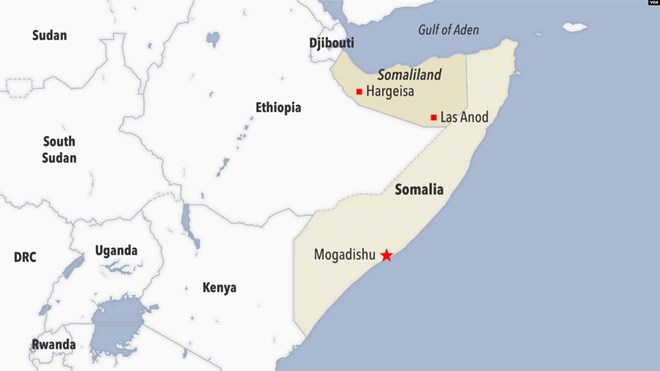
Saturday October 5, 2024
By Mohamed Olad Hassan

Washington— In a crucial week for Somalia's security plan, discussions in Washington and New York have underscored the urgent need for preparation for the upcoming African Union Support Mission in Somalia (AUSSOM), as escalating tensions between Somalia and Ethiopia over a maritime agreement Ethiopia signed with Somaliland raised concerns among international stakeholders.
Somalia is set to determine the composition of its upcoming AUSSOM following the expiration of the current AU mission.
Hussein Moalim, Somalia's national security adviser, stated that Somalia is firm in its position on Ethiopian forces' participation in the new mission.
"Somalia would not consider Ethiopian troops to be part of the new mission unless it withdraws from the illegal memorandum of understanding signed with [Somalia's breakaway region of] Somaliland earlier this year," Moalim said Thursday in an interview with VOA Somali.
The controversial memorandum of understanding, also known as an MoU, has escalated tensions between the two neighboring nations, granting Ethiopia access to a 20-kilometer (12.4 mile) stretch of Red Sea coastline in return for potential recognition of Somaliland's independence.
Somalia views the MoU, signed in January, as a violation of its sovereignty and territorial integrity, leading to a diplomatic rift that has included the expulsion of the Ethiopian ambassador from Mogadishu and threats to remove thousands of Ethiopian troops stationed in parts of south and central regions of the country.
Despite two rounds of mediated talks by Turkey yielding no results, Somalia's State Minister of Foreign Affairs Ali Omar Balcad insists that effective dialogue hinges on addressing issues of Somalia's sovereignty infringement and restoring trust.
"First we need to solve the issue on our sovereignty infringement and second to restore the trust and the diplomatic relations between us, and then there comes the negotiation on the Ethiopia desire to access our sea and ports," said Balcad in an interview with VOA Somali.
UN urges diplomatic resolution
In New York, the United Nations Security Council addressed the security situation in Somalia on Thursday, stressing the urgency of finalizing plans for the new AU stabilization mission.
During the discussion, concerns were raised regarding escalating tensions between Somalia and Ethiopia, with James Swan, acting special representative of the secretary-general, urging both nations to seek a diplomatic solution within the framework of international law.
Ambassador Robert Wood, the U.S. alternative representative for special political affairs, echoed these sentiments, highlighting the detrimental impact of rising tensions on regional security.
"Colleagues, we are deeply concerned about rising tension between Ethiopia and Somalia and the negative impact it is having on shared security interests," Wood said.
In discussions held in Washington this week, Somali officials, along with representatives from the U.S., Qatar, Turkey, the United Arab Emirates and the U.K., emphasized the urgency of finalizing funding options for the new peacekeeping mission.
Somalia's Moalim reiterated the commitment of international partners to support Somalia's security, stability and sovereignty.
"The partners reaffirmed their unwavering support for the federal government of Somalia in its efforts to attain stability and security across the nation," he said.
Ethopia denies Somalia's allegations
Briefing the U.N. Security Council, Somali Foreign Minister Ahmed Moalim Fiqi accused Ethiopia of using the fight against terrorism as a pretext for territorial expansion.
"Let me be clear. The claim that Ethiopia is in Somalia to fight terrorism is a pretext for annexation," Fiqi asserted, adding that Somalia has intercepted three illegal arms shipments from Ethiopia in the past three months, fueling local conflicts and empowering extremist groups.
"We call these actions a clear violation of Somalia's sovereignty," he said.
Ethiopia has been constantly denying Somalia's accusations against Ethiopia, including its intention behind the MoU signed with Somaliland.
During last month's meeting of U.N. General Assembly, Ethiopian Foreign Minister Taye Atske-Selassie said his country had nothing to do with Somalia's allegations.
"Ethiopia's memorandum of understanding with Somaliland is based on existing political dispensation in Somalia," he said.
"Our objective is a shared growth and prosperity in the region. Similar agreements have been concluded by other states, and there is no reason for the government of Somalia to incite hostility that obviously intends to cover internal political tensions," he added. "I therefore reject the unfounded allegations leveled against my country."
Falastin Iman in Washington contributed to this report, which originated in VOA's Somali Service.